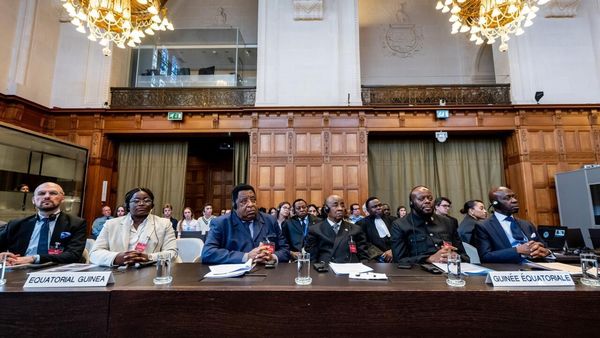
A drama about the epic horrors that migrants have faced could not speak to the moment more keenly as the government fights over its own Rwanda bill and small boat crossings claim yet more lives. Created by Amit Lahav, whose grandmother’s flight from Yemen to Palestine in 1932 is a central driver of the plot, it is a production that is ravishing and frustratingly esoteric in equal measure.
Devised by physical theatre company Gecko and interweaving the migrant stories of its 10 performers, its drama is delivered through expressionistic movement, mime, music and dance, rather than words. What few are spoken come in a babel of Hebrew, Mandarin, Cantonese, Malayalam, Norwegian and Spanish, among others. This deliberate push away from reliance on language is a clever way of mirroring the incomprehension that a migrant might feel in a host culture, and country, but it locks us out of characters’ inner lives and the specificity of the stories being told.
There are two – possibly three – families here, one dramatising that of Lahav’s persecuted grandmother, while the others are of indeterminate origin. We see the repeated rejection, and humiliation, of characters at the hands of cartoonishly cruel border guards who kick, punch, spit and carouse. Repetition might be emphatic in conveying the sense of never-ending setbacks for these characters but the repeated cycles of similar scenes stays flat rather than building emotional layers.

Families are shown separated and reunited, anguished and rejoicing, numerous times. One scene with an apparently Indian family appears to conjure a train which might refer to Partition-era India. Characters flail in lifejackets in what might be a reference to small boat crossings. Ultimately, too many stories are being told, too indistinctly and not saying quite enough. The result is a universalising of migrant experience that ends up feeling generic.
It is a shame because the aesthetics are so arresting: anguished scenes emerge out of cinematic darkness. Sofas and tables are upturned in Rhys Jarman’s set design and then come together to form a family hearth again. Puppetry is used to exquisite effect, and a haunting soundtrack, designed by Mark Melville, combines searing vocals with music from around the world. Best of all is Chris Swain’s astonishing lighting design which creates stunning chiaroscuro effects and captures the lights of passing ships when characters appear to be engulfed in ocean waves. Sometimes they are turned towards the auditorium and blind us with their hostile glare.
More often you admire these gorgeous effects rather than feel the drama in your gut.
• At the Lyttelton theatre, National Theatre, London, until 27 January.
• This article was amended on 17 January 2024 to correctly credit the main image to Mark Sepple.







